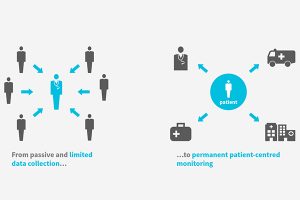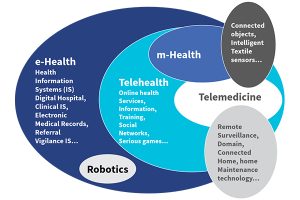More than ever, HealthTechs can provide solutions to the unprecedented COVID-19 health crisis
 by Ariane Kouassi
by Ariane Kouassi Jun 12, 2020
Jun 12, 2020 4 min
4 min
In Francophone Africa, digital is positioned as an opportunity in the management of the COVID-19 crisis. How can health tech help democratize access to healthcare? This blog from MSC gives examples of digital solutions in health.
The COVID-19 global health crisis is unprecedented. While it challenges health systems across the world and in Africa in particular, it also sheds light on opportunities linked to digital health.
Countries in Africa provide only 36% of the essential services its populations require to maintain health and well-being. According to the World Health Organization (WHO) estimates, Africa has an average of only 10 beds for 10,000 people in intensive care units.
The Ebola epidemic of 2014-16 highlighted many failings of the health systems in the continent. The coronavirus (COVID-19) outbreak is testing the region once again. The rapid and exponential spread of the virus has given rise to many initiatives that seek to overcome what some have termed a “healthcare war”. HealthTechs and other players in the ecosystem have increased efforts to stop the propagation of COVID-19. CcHub, the largest innovation incubator in Africa, for example, announced funding and technical support for technology projects that work to slow COVID-19 and mitigate its social and economic impact.
Digital technology could present the beginning of a solution for African countries, given the region’s widespread lack of infrastructure, healthcare workers, and equipment. In African countries at the heart of the digital revolution, some start-ups that focus on social impact have developed digital financial platforms that offer loans to small enterprises. Others have designed digital products that offer mental health support to people in isolation, or open-source coding to develop affordable ventilators.
Digital technologies can provide invaluable support to the healthcare sector. They can help conduct remote monitoring and follow the spread of infectious diseases. People can use digital technologies to teach security measures through gamification and avoid contagion in the process. The balancing of public health protection and privacy rights is a challenge that encryption and anonymization technologies can resolve. “Harnessing the power of digital technologies is essential for achieving universal health coverage”, notes WHO Director-General, Dr. Tedros Adhanom Ghebreyesus. Back in 2005, the WHO adopted a resolution designed to establish a global eHealth strategy, which led to the creation of the Digital Health Atlas.
These technology innovations place the patient at the heart of processes, improve information flows, and allow for shorter timeframes than traditional approaches. The strength of HealthTechs lies in their creativity, their adaptability, and their speed of execution. They have an innate ability to understand client needs and design tailored products or services to meet such needs, with the flexibility to modify these products and services quickly to reflect market evolutions.

Source: Whithings, Livre blanc Santé Connectée, 2014
HealthTechs encompass a range of different services. They provide critical solutions to help respond to growing patient demands and relieve hospitals under pressure. Telemedicine, for example, which uses technology to provide remote healthcare services, contributes to filling in the gap when doctors are not available by offering remote consultations. This could provide effective solutions for isolated populations that usually lack access to these types of services.
Teledermatology helped care for 406 patients over a year and a half during its pilot phase in Bamako, Mali. Today, in Francophone Africa, over 4,000 people have access to healthcare services through the Bogou platform, which provides support in areas, such as obstetric emergencies, pediatrics, cardiology, and dermatology.

Source: WHO, Global diffusion of eHealth, 2016
mHealth uses mobile devices, such as smartphones, sensors, and tablets to allow patients to collect data on their own. In response to the COVID 19 crisis, Kemais Gomun developed his Apollo app in Côte d’Ivoire, in under two months. This free mobile application uses geo-location and self-diagnosis functions to help identify priority patients and improve patient care. Data collected through the app is sent to the National Public Hygiene Institute, which coordinates patient care in response to COVID 19.
eHealth offers solutions that range from prevention to treatment, as well as training for healthcare professionals. In Togo, for example, the government launched an official information portal in less than a week after the first cases were reported in the country, to provide reliable information on coronavirus. This includes information on symptoms and the spread of the virus across the country. The portal also offers information on where to seek medical help, health guidance, measures taken by the government to tackle the crisis, and links to useful media and other third-party resources.
However, although HealthTechs could contribute effectively to democratizing access to healthcare, they face several challenges. Connectivity and access to digital platforms are essential for the effective rollout of digital health solutions. Internet coverage remains limited and expensive in most sub-Saharan African countries, where only 22% of the population has an internet subscription. The continent also lacks visibility on the different players in the field of digital health and their initiatives.
MSC is currently working on mapping out the different players in the HealthTech sector in Francophone Africa. The objective of the project is to paint a picture of the tech start-up ecosystem in Francophone Africa and provide an opportunity to identify enterprises with a high potential for impact or growth. This will enable governments and West African businesses to collaborate with the start-ups they see as having direct value, provide a greater number of effective regulatory frameworks, and resolve current inefficiencies.
Francophone Africa has seen an exponential growth in start-ups that offer digital health solutions and is poised for the development of such solutions. The growing awareness of the opportunities digital technology presents for the healthcare sector is promising for HealthTechs. While some countries in the region are already well advanced in digital health, the success of these new models lies in the ability of HealthTechs to clarify their business models. It also lies ineffective public and private partnerships, which require the establishment of enabling and incentivizing regulatory frameworks.

Leave comments